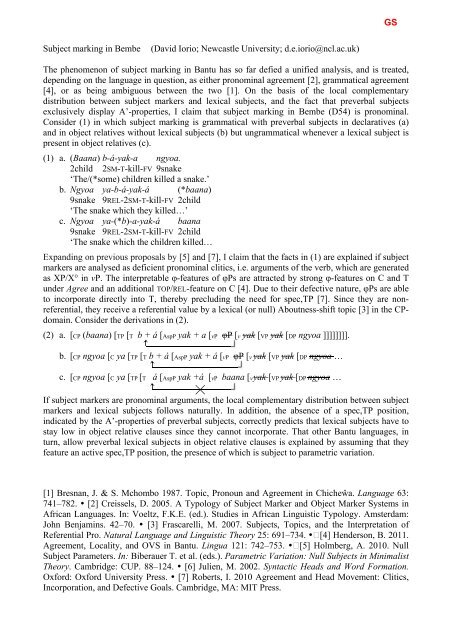here - 5th International Conference on Bantu Languages
here - 5th International Conference on Bantu Languages
here - 5th International Conference on Bantu Languages
Create successful ePaper yourself
Turn your PDF publications into a flip-book with our unique Google optimized e-Paper software.
Subject marking in Bembe (David Iorio; Newcastle University; d.e.iorio@ncl.ac.uk)<br />
The phenomen<strong>on</strong> of subject marking in <strong>Bantu</strong> has so far defied a unified analysis, and is treated,<br />
depending <strong>on</strong> the language in questi<strong>on</strong>, as either pr<strong>on</strong>ominal agreement [2], grammatical agreement<br />
[4], or as being ambiguous between the two [1]. On the basis of the local complementary<br />
distributi<strong>on</strong> between subject markers and lexical subjects, and the fact that preverbal subjects<br />
exclusively display A’-properties, I claim that subject marking in Bembe (D54) is pr<strong>on</strong>ominal.<br />
C<strong>on</strong>sider (1) in which subject marking is grammatical with preverbal subjects in declaratives (a)<br />
and in object relatives without lexical subjects (b) but ungrammatical whenever a lexical subject is<br />
present in object relatives (c).<br />
(1) a. (Baana ) b-á-yak-a ngyoa.<br />
2child 2SM-T-kill-FV 9snake<br />
‘The/(*some) children killed a snake.’<br />
b. Ngyoa ya-b-á-yak-á (*baana)<br />
9snake 9REL-2SM-T-kill-FV 2child<br />
‘The snake which they killed…’<br />
c. Ngyoa ya-(*b)-a-yak-á baana<br />
9snake 9REL-2SM-T-kill-FV 2child<br />
‘The snake which the children killed…<br />
Expanding <strong>on</strong> previous proposals by [5] and [7], I claim that the facts in (1) are explained if subject<br />
markers are analysed as deficient pr<strong>on</strong>ominal clitics, i.e. arguments of the verb, which are generated<br />
as XP/X° in vP. The interpretable φ-features of φPs are attracted by str<strong>on</strong>g φ-features <strong>on</strong> C and T<br />
under Agree and an additi<strong>on</strong>al TOP/REL-feature <strong>on</strong> C [4]. Due to their defective nature, φPs are able<br />
to incorporate directly into T, t<str<strong>on</strong>g>here</str<strong>on</strong>g>by precluding the need for spec,TP [7]. Since they are n<strong>on</strong>referential,<br />
they receive a referential value by a lexical (or null) Aboutness-shift topic [3] in the CPdomain.<br />
C<strong>on</strong>sider the derivati<strong>on</strong>s in (2).<br />
(2) a. [CP (baana) [TP [T b + á [AspP yak + a [vP φP [v yak [VP yak [DP ngyoa ]]]]]]]].<br />
b. [CP ngyoa [C ya [TP [T b + á [AspP yak + á [vP φP [v yak [VP yak [DP ngyoa …<br />
c. [CP ngyoa [C ya [TP [T á [AspP yak +á [vP baana [v yak [VP yak [DP ngyoa …<br />
If subject markers are pr<strong>on</strong>ominal arguments, the local complementary distributi<strong>on</strong> between subject<br />
markers and lexical subjects follows naturally. In additi<strong>on</strong>, the absence of a spec,TP positi<strong>on</strong>,<br />
indicated by the A’-properties of preverbal subjects, correctly predicts that lexical subjects have to<br />
stay low in object relative clauses since they cannot incorporate. That other <strong>Bantu</strong> languages, in<br />
turn, allow preverbal lexical subjects in object relative clauses is explained by assuming that they<br />
feature an active spec,TP positi<strong>on</strong>, the presence of which is subject to parametric variati<strong>on</strong>.<br />
[1] Bresnan, J. & S. Mchombo 1987. Topic, Pr<strong>on</strong>oun and Agreement in Chicheŵa. Language 63:<br />
741–782. [2] Creissels, D. 2005. A Typology of Subject Marker and Object Marker Systems in<br />
African <strong>Languages</strong>. In: Voeltz, F.K.E. (ed.). Studies in African Linguistic Typology. Amsterdam:<br />
John Benjamins. 42–70. [3] Frascarelli, M. 2007. Subjects, Topics, and the Interpretati<strong>on</strong> of<br />
Referential Pro. Natural Language and Linguistic Theory 25: 691–734. [4] Henders<strong>on</strong>, B. 2011.<br />
Agreement, Locality, and OVS in <strong>Bantu</strong>. Lingua 121: 742–753. [5] Holmberg, A. 2010. Null<br />
Subject Parameters. In: Biberauer T. et al. (eds.). Parametric Variati<strong>on</strong>: Null Subjects in Minimalist<br />
Theory. Cambridge: CUP. 88–124. [6] Julien, M. 2002. Syntactic Heads and Word Formati<strong>on</strong>.<br />
Oxford: Oxford University Press. [7] Roberts, I. 2010 Agreement and Head Movement: Clitics,<br />
Incorporati<strong>on</strong>, and Defective Goals. Cambridge, MA: MIT Press.<br />
GS


